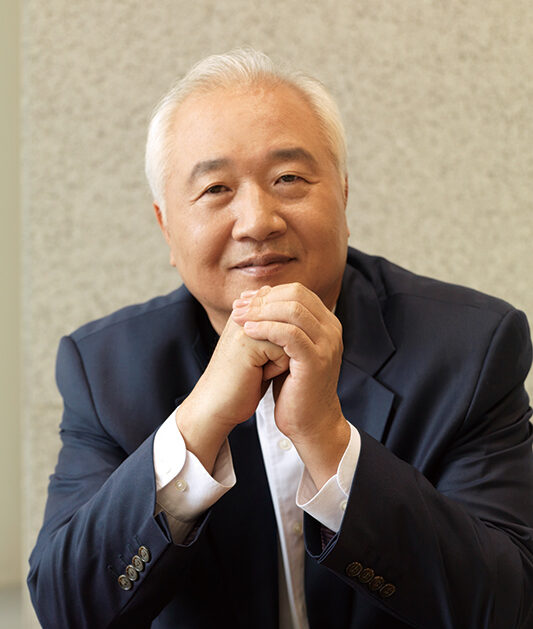Founder’s Greetings

반갑습니다. (Bangapseumnida)
It’s good to meet you.
The common Korean greeting, “반갑습니다” (It’s good to meet you), carries a profound meaning. While “Ban (반)” can be translated as “divine” or “God,” its root, “bangapda (반갑다),” suggests “You’re like Ban (ban gatda),” or, “You’re godlike.” This greeting encapsulates the core essence of Korean spirituality, Chun Ji In (천지인, 天地人) Thought, which perceives heaven, earth, and humanity as one.
As we journey through the 21st century, international perceptions of Korea are undergoing a significant transformation. Emerging from the aftermath of the Japanese Occupation and the subsequent Korean War, Korea achieved industrialization and democratization in the 20th century, transitioning from a receiver to a benevolent provider of international aid. The global appetite for Korean culture, from tae kwon do and Korean dramas to B-boys, cuisine, and K-pop, is ever-increasing.
The inception of “Brain Education” arose from inquiries into Korea’s potential contributions to global society in the 21st century and a dedicated quest for answers, specifically, uniquely Korean values with the capacity to influence globally. At the inaugural International Brain Education Conference held at the United Nations Headquarters in 2008, Brain Education was showcased as a “tool and method for practicing peace.” This peace-oriented philosophy is deeply rooted in the concept of the Hongik Human (홍익인간, 弘益人間), which upholds the principle of benefiting all — a foundational ideology of the ancient Korean kingdom of Dahngun Joseon and the universal spirit of humankind.
Korea’s traditional culture accentuates experiential learning, harmonizing mind and body, coexistence with nature, and the unity of heaven, earth, and humanity. Our ancestors created a lifestyle and culture centered around Shimshin Ssangsu (심신쌍수, 心身雙修) — a holistic approach to cultivating both body and mind. This was complemented by methodologies for enhancing human consciousness, encompassing principles like Suseung Hwagang (수승화강, 水昇火降, Water up, fire down), Shim Ki Hyeol Jung (심기혈정, 心氣血精, Energy follows the mind), and Jungchoong, Kijang, Shinmyung (정충기장신명, 精充氣壯神明, The body is filled with vital energy, the energy becomes mature, and spirituality is awakened).
Rooted in ancient Korean teachings, the text Sam Il Shin Go – Shinhun Pyeon (Divine Decree of Three-in-One – Teachings on the Divine) imparts the verse:
“Seek [God] in your true nature. He already resides within your brain (자성구자 강재이뇌, 自性求子 降在爾腦)”
These teachings form the foundation of today’s brain philosophy. By the 1990s, advanced nations worldwide turned their attention to the brain. Competing for supremacy in this domain, they heavily invested in brain science, exploring its functions, structures, and ailments, acknowledging its role as the mind’s command center.
Yet, beyond the insights from scientific and medical explorations of the brain, true sustainability lies in transforming our lives by harnessing the organ’s potential. In this context, Brain Education advocates for seeing the brain not just as a biological entity, but as a vessel for application and development.
At the crossroads of the tangible and intangible, humanity is embarking on an unprecedented epoch. With “information” becoming civilization’s linchpin in our interconnected world, advances in artificial intelligence challenge us to contemplate our unique human identity and the essence of human values.
In the interconnected information society of the 21st century, technologies for processing and utilizing information will be paramount. Brain Education represents a groundbreaking “information technology” designed to transform the brain’s information system, steering it towards harmony and peace. This is why Brain Education is heralded as the “Fifth Industrial Revolution.”
Changes in the brain can be targeted for application. In our digital age, marked by reduced physical activity and heightened mental stress, imbalances are emerging in our autonomic nervous systems and homeostatic mechanisms. Future methods will seek direct and swift brain stimulation and restoration of lost senses, possibly utilizing natural elements like Hwangchil(Dendropanax morbifera) and raw materials for aromatherapy.
Founded in Korea in 2004, the International Brain Education Association (IBREA) is a global nonprofit organization. Recognizing that contemporary civilization stems from the human brain’s creativity, IBREA believes that the solutions to our pressing issues — the erosion of human spiritual values and threats to our ecosystem — reside within the human brain. Its mission is to advocate for Brain Education, emphasizing its principles for fostering peaceful minds and pioneering methods for human resource development and augmenting inner capabilities.
In pursuit of this mission, IBREA aligned with the United Nations Global Compact (UNGC) in February 2009, fostering collaboration with the global community to achieve growth beyond borders, ethnicity, and religion. By 2010, it was approved as an associated NGO to the UN Department of Public Information (UN–DPI). In 2015, the IBREA Foundation, established in the U.S., earned consultative status with the UN Economic and Social Council.
With the firm belief that Brain Education can bring transformative shifts in human consciousness and global civilization, by harmonizing our two driving forces – the human brain’s creativity and its inherent peace – we invite you to be part of our mission in introducing this peaceful technology to the global arena.
Thank you,
Ilchi Lee
www.ilchi.com

